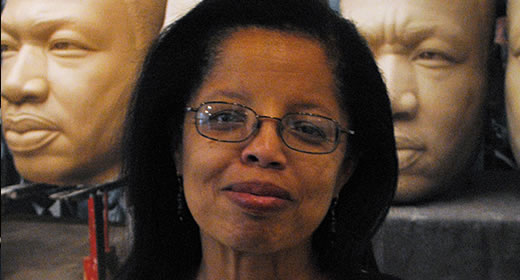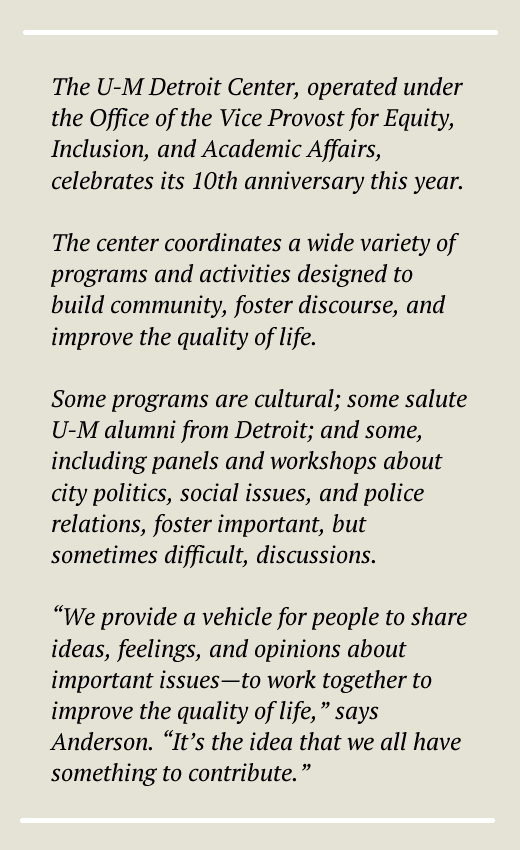
Addell Austin Anderson (MPP '80) was born in Detroit in the 1950s and lived in Black Bottom, a predominantly African-American neighborhood. In later years, her father told her stories about the close-knit community with its many black-owned businesses and about how nice it was to share a neighborhood with many of their relatives.
Stories and a few vague memories are all most of this is to Anderson. When she was just four years old her family was forced to move because their home and much of the neighborhood were determined to be in the way of progress; the buildings were soon razed to construct Interstate 375.
To the many who lived there or visited, Black Bottom and the adjacent Paradise Valley neighborhoods were the best of Detroit—in a time before battles for civil rights and desegregation, these were places where black folks could own businesses, shop at African-American-owned stores, and see artists like Duke Ellington, Ella Fitzgerald, and Count Basie.
Elsewhere, however, groups of policymakers saw the area as "blighted" and, perhaps conveniently, standing in the way of transportation improvements. With residents given 30-day vacancy notices, 200 acres were cleared and the highway and mixed-income housing were constructed. Anderson's own family moved from Black Bottom to the blue-collar Detroit suburb of Romulus.
Anderson's father's stories left her not only wondering what life would've been like if she could've grown up in a community like Black Bottom, but the stories also struck her as showing disregard for many of the home and business owners. And by the time Anderson was a high-school student, she knew she wanted to work in public service so she could do her part to ensure government treated people fairly.

To this end, she earned her bachelor's degree in business and economics at Kalamazoo College before enrolling in the Ford School's MPP program.
"I knew I wanted to work in government," recalls Anderson of her time between degree programs, "and, at that time, most people probably would've gone for a master's in public administration. But while looking into the economics program at Michigan, I came across a brochure for the MPP program. I was struck by it being interdisciplinary and more quantitatively based than a public administration program."
But one of her strongest memories from her time at the Ford School wasn't related to the quantitative core of the policy program—it was related to a course she took with Professor John Chamberlin on "Values and Ethics in Public Policy." It was a course that affirmed why she had chosen to work in public service: people matter.
Chamberlin had put the students in small groups, and asked them to navigate a highly charged policy issue: prioritizing a waiting list for an organ transplant.
"We talked about ranking the list one way or another," she says, "like maybe giving priority to the youngest so that they might live the longest, but in the end our group couldn't agree on how to do it. So we copped-out and decided on a first-come, first-served list."
"Well, John Chamberlin really let us have it. He told us that what we'd done was irresponsible. Even though this was a classroom assignment, we'd be in the real world someday and it wouldn't be acceptable to just throw our hands up and take the easy way out. As we work in our jobs, we need to remember, real people matter," he said. "And we have to take seriously how we will impact people's lives, as well as those who care about them."
Policymaking is complicated. People hold a wide variety of values and have differing needs and priorities. There are only so many organs to go around, and one person's home is another's blighted obstruction to progress. Making a well-reasoned choice when there is no outcome in which everyone benefits is one of the greatest challenges policymakers face.
"People matter. That's the most important thing I got out of that class and, really, out of my time at the Ford School overall."
These days, as director of the University of Michigan Detroit Center, Anderson serves as a liaison to a wide variety of people across the city of Detroit and at the university. When Detroit schools, community organizations, and city government leaders have a project they think would benefit from university involvement, Anderson matches the opportunities, needs, and resources of the city with those of the university. And equally important, she is there to help the university's students and faculty access the rich cultural, educational, and civic opportunities unique to the city she loves.
Story by Bob Brustman for State & Hill, the magazine of the Gerald R. Ford School of Public Policy
Anderson Photo: Mike Morland / Detroit Center
Below is a formatted version of this article from State & Hill, the magazine of the Ford School. View the entire Fall 2015 State & Hill here.
